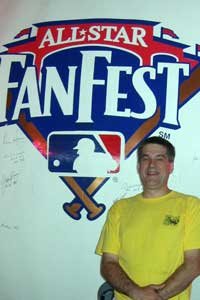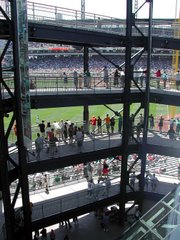I've read many times about how the 1950s, at leat the earlier part of the decade, supposedly represented baseball's Golden Age; those accounts mostly were written by New Yorkers who enjoyed seeing a team from New York in the World Series each and every year.
The spell was broken somewhat when the Giants and Dodgers bolted for the West Coast after the 1957 season. But enough prose had come out of the media capital of the world to ensure New York's status as baseball's epicenter for time immemorial.
There are reasons to dispute the '50s as a golden era. Attendance at most ballparks took a severe dip after a postwar boom, causing three teams -- the Boston Braves, St. Louis Browns and Philadelphia Athletics -- to move out of their cities in rapid succession, followed shortly by the New York Giants and Brooklyn.
Speaking of the ballparks, most had been built nearly half a century before and were located in places that lacked what had become essential: parking for automobiles. Some of the neighborhoods around the parks had deteriorated to the point where families didn't exactly feel comfortable attending games.
Integration started with Jackie Robinson in 1947, but many teams took their good old time when it came to bringing in black players. The Yankees were among the stragglers, with Elston Howard making his debut in 1956, after team management combed the organization for a suitable candidate; the talented first baseman Vic Power was dealt away because he was considered to be too flamboyant.
And the Boston Red Sox, which have become one of baseball's most revered franchises, didn't have an African American on the team until Pumpsie Green in 1959.
If you lived in New York, everything was fine: half the World Series played in the '50s involved both teams from that city. And if you count the Dodgers in 1959 after they moved to Los Angeles, every Series of the '50s involved a team from New York.
Everyone's personal Golden Age of Baseball seems to relate to his childhood, when he first starting following the sport. I'm no exception, but I'd like to state a case for the period of roughly 1965 to 1975. I came in toward the end of that decade, first paying real attention to baseball at the tail end of the '72 season and absorbing it in 1973. (Yes, I vaguely remember when American League pitcher hit for themselves against other AL teams.)
Anyway, here are some reasons:
• This era represented baseball's best attempt at putting everyone on an equal footing. The amateur draft started in 1965, and free agency didn't really start kicking in until 1976. Before '65, the teams with the most money were likely to sign the best prospects. After '76 ... well, you know what happened.
• Baseball still was the national pastime. Football made some inroads during the 1960s, but the first few Super Bowls during comparatively minuscule attention. (Of course, it took a New York connection, the Joe Namath Jets, to put the Super Bowl in the spotlight.) The World Series still was the biggest game in town, and it still was played during the day, for the most part.
Speaking of which, people my age still fondly reminisce about taking little transistor radios into school and trying to catch what was going on during the playoffs and Series before the teacher caught us. Or sometimes they'd wheel in a television and let everyone watch.
• Every year, some larger-than-life event was likely to occur: Koufax's perfect game in '65 ... Frank Robinson's triple crown and leading the Orioles to a Series sweep in '66 ... the Red Sox' "Impossible Dream" and Yaz's triple crown in '67 (although the Sox lost the Series) ... the Year of the Pitcher in '68, with McLain's 31 wins, Gibson's 1.12 ERA, Drysdale's 58 2/3 consecutive scoreless innings and the Yankees' .214 team batting average ... the '69 Miracle Mets, who won the World Series after never finishing higher than ninth place in their existence ... Brooks Robinson's one-man show in the '70 Series ... Reggie Jackson hitting a ball in the '71 All-Star Game that still might be traveling in the ozone ... Steve Carlton racking up 27 wins for the last-place Phillies in '72 ... Nolan Ryan setting the strikeout record and pitching two no-hitters in '73 ... Hank Aaron breaking the career home run record in '74 ... Carlton Fisk's home run winning the sixth game of the '75 Series.
Just a sampling.
• The Yankees were not in the postseason from 1965 through 1975. (In that context, a case could be made for 1982 through 1994 being an even more golden era, but ...)
I realize baseball had some not-so-pleasant issues to confront between 1965 and 1975. The players' union gained in stature, creating a climate that resulted in a series of work stoppages, including the interruption of the start of the '72 season. Curt Flood started the ball rolling that led to free agency, which led to ruining baseball in places like Pittsburgh, Kansas City and especially Montreal. The first night World Series game took place in 1971; soon, most were played at night, and since 1984, they all have. The American League, suffering from poor attendance, decided to let a regular hitter bat for the pitcher, in what started as a three-year "experiment"; today, baseball is the only sport with significantly different rules for two components of the same ostensible organization.
And Charlie Finley watched his Athletics, laughingstocks while in Kansas City, become a dynasty after they moved to Oakland. But he didn't like to part with his money, and his star pitcher Jim "Catfish" Hunter found a loophole that allowed him to sign with whatever team ponied up the most cash.
Of course, that was the New York Yankees.
Goodbye, Golden Age.
Saturday, May 5, 2007
Subscribe to:
Post Comments (Atom)









No comments:
Post a Comment